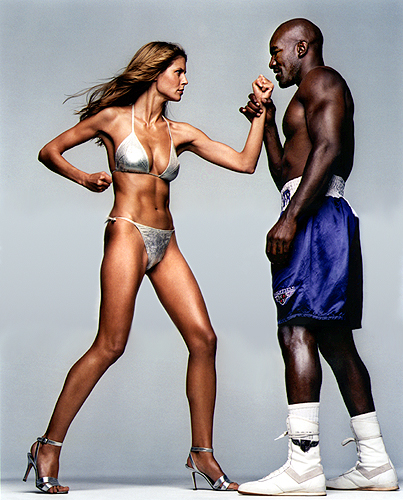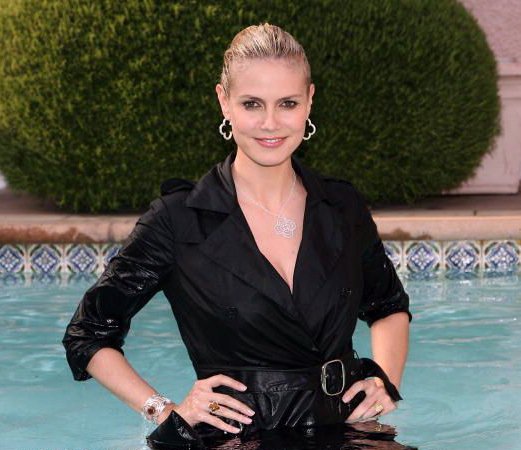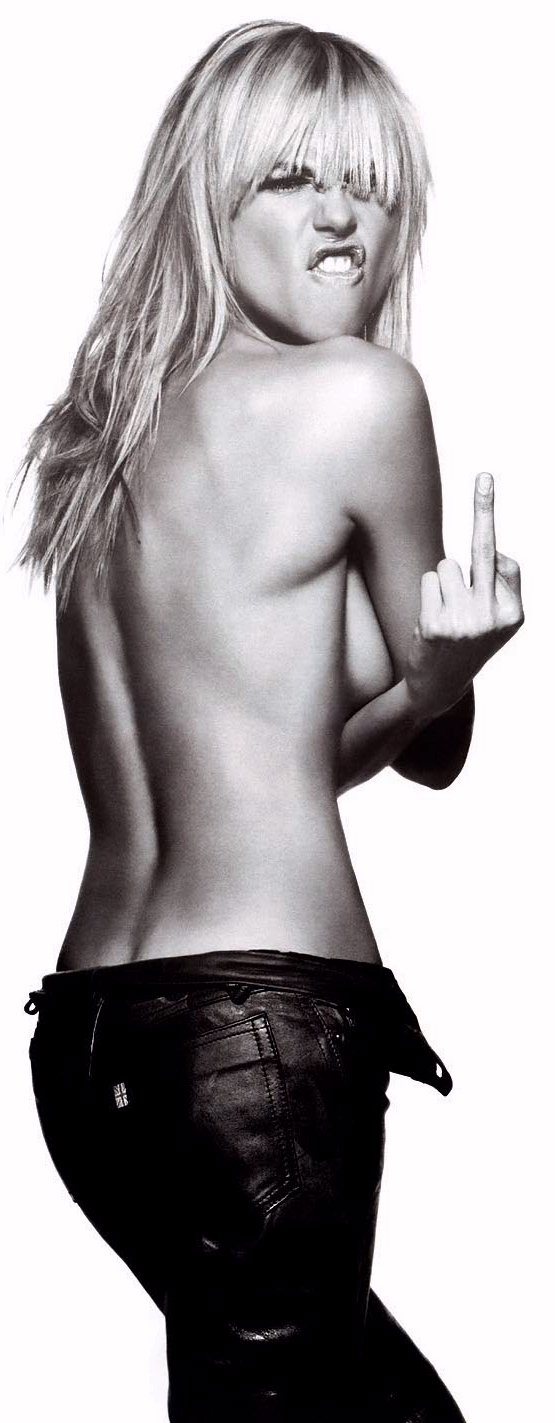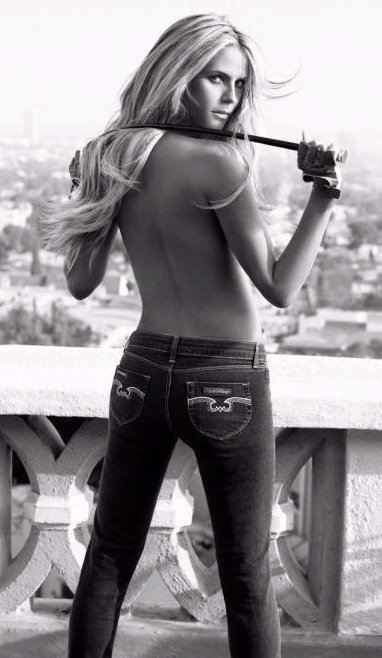| Supermodel by Heidi Klum
The Fashion eZine - Fashion Models
Defining SupermodelsBy Heidi Klum. I always hate to say "supermodel." I guess I turned out to be that way now, but it's just a funny thing--you don't want to say that of yourself. "Supermodel" means you're a household name as a fashion model. I think I'm going more toward being a personality. I do a lot of television. I've done Jay Leno and Keenan Ivory Wayans and David Letterman and Larry Sanders, and I did six episodes of Spin City. I do E!, Extra Hollywood. So I feel like people get a little bit closer to me than just a model doing advertising, because now there is something more behind me than just a face. Being on the cover of the 1993 Sports Illustrated swimsuit issue was my big break. I had done Victoria's Secret a lot before, which is another amazing thing to do, but the Sports Illustrated cover for me was the one. When it hit the newsstands I got to do it all--every radio station, lots of press interviews, all the big shows. My day rate went way up. Suddenly I got to work with some of the world's greatest fashion photographers. I shot with Steven Meisel. I did several covers. People all of the sudden are like, "Ooo, who is that girl?"
Of course, it was not like I just came to this. I won a modeling contest in Germany--that's how I got started. One day I was flipping through a fashion magazine with my girlfriend, and we noticed a coupon for a modeling competition they were having on this show hosted by Thomas Gottscheit, who is sort of the David Letterman of Germany. So I sent the coupon in with some snapshots from my family's photo album. I didn't hear anything for a while, and I almost forgot about it. Then everything happened really fast. They called me and my parents, and they're like, "We want you to come to Munich for a casting." So we went, and then I won the competition. It was pretty amazing. I'd never thought about being a model. I was still going to high school. I had just filled out this coupon for the heck of it. And all of a sudden I won this big contract with a modeling agency for three hundred thousand dollars. I didn't even know how much three hundred thousand dollars was.
This was 1993. I started going to shoots in Munich and then to Hamburg. My father would drive. I'd have a map and we would go around finding these places together. Often getting lost, too. [Laughs] I did lots of test pictures. I really wanted to work. I'd do ten shoots a day if I could. It just seemed wrong whenever I wasn't busy. I mean, I had won this contest out of something like thirty thousand girls. And the public watching the show on TV had voted me the winner. So I felt a little like someone who gets elected to something. I just felt like I always had to push. Eventually I wound up in Miami, which was like Party City. I couldn't believe what went on there. I was only nineteen. I'd never seen so many good-looking people in my whole life. And so many models! You'd go to castings where you put our name on a list and you're number two hundred and fifty. So you walk down the street, have a café latte, and you come back an hour later and it's still not your time. After four weeks of it I said, "I'm out of here." I called my agency in New York who I won the contract with and told them, "I'm sitting here with four hundred people in this casting! I won this big contract! I want to work! What are you guys going to do with me?" So I came up to New York and the agency people looked me over. I think they didn't know at first what to do with me. I still had a baby face. My hair was down my butt. My nails were long. I had baggy pants. I had no style. You know, I was just a girl from Bergisch-Gladbach! So they got my hair cut, told me my nails had go, told me I had to wear tighter clothes and not cover up so much. And the smile. The worst for me was the smile. I was just so stiff and so bad at it. But this one photographer told me, "Go home and train in front of the mirror. Look at yourself and relax. See the camera as your friend. Don't see it as your enemy." So I went home and I learned in front of the mirror how to smile. Now it's very funny because that's what I'm known for--my smile.
All this input really helped--right away things began to happen. I did a big campaign for Bonnie Bell. Then I did a couple of covers for Self and New Woman. It started to roll, you know? And I was a little lucky, too, because when I started there was that whole waif look, where the girls were all so skinny and sick-looking. I was a little out of place. But then, thank God, boobs came back and curves came back. The healthy and natural look. And that was my look, so in a sense I was just there at the right time. I started working at a hundred miles an hour, going from one job another, traveling from Mexico to Milan to Paris, going all over. And then I did the Sports Illustrated thing and that was like a jumping board, you know. Like swimmers you jump on the board and you go, "Schwam!" That totally did it for me. Now, I never sit around. Because there's always something. Always. And I know it's a cliché, but it's true--modeling is a lot more than standing in front of a camera. It's a business. If I have a shoot at nine, my day starts at seven. I make the bed, and then I take care of paperwork. I get lots of faxes coming in day and night. Because America is not the only market I'm dealing with. I have other markets where I have to review interviews that I've done. I have to look at photos that get resold in Africa and Mexico and Spain. In Germany, in France. I have to decide which picture they should use. Is this okay? Is it not okay? What do you think? And you're not going to the same office or studio each day, so you're arranging for shoots, getting airplane tickets together, hotels, clothes, discussing things with your agent. Who's the photographer? Who's the makeup artist? Who's the client? You need a good team of people with you. I mean, you're the face, you're the one who's out there, but it's definitely not like you're doing it on your own. And I have a lot of fun because I really like all these different people I work with. A lot of them are the same ones from job to job so we've become like little family groups.
|
|
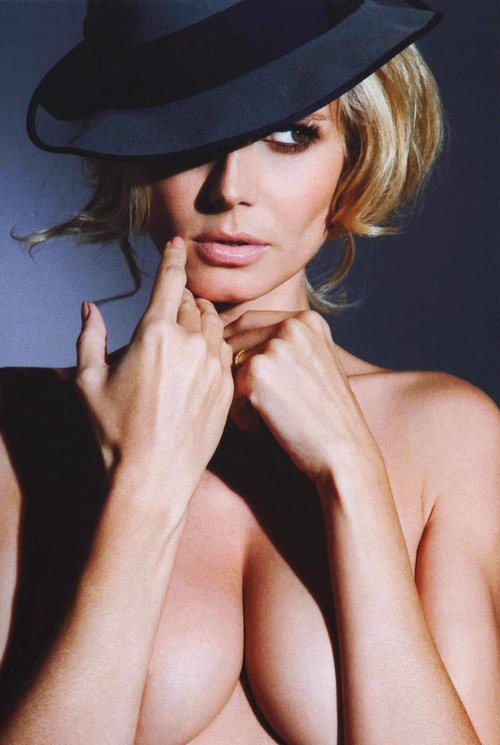 Then there's the public. [Laughs] People reacting to you as a famous person definitely takes some getting used to. It can be very weird. [Laughs] I mean, I actually like meeting people, as long as they're not scary or trying to take advantage of me. But some of them are just getting your autograph to sell it. You can tell because they have a special pen. It has to be blue instead of black or something, because otherwise, it looks like a stamp. That sort of thing I don't like. And you have to be cautious, because there's a lot of crazy people out there. For example, I was on the David Letterman show and afterward some people in a car started chasing us through the streets of New York. We drove around and around and couldn't lose them. I couldn't go to my house. What was I going to do? I don't want these people to know where I live, otherwise I will have them sitting in front of my house the next day or coming through my window.
Then there's the public. [Laughs] People reacting to you as a famous person definitely takes some getting used to. It can be very weird. [Laughs] I mean, I actually like meeting people, as long as they're not scary or trying to take advantage of me. But some of them are just getting your autograph to sell it. You can tell because they have a special pen. It has to be blue instead of black or something, because otherwise, it looks like a stamp. That sort of thing I don't like. And you have to be cautious, because there's a lot of crazy people out there. For example, I was on the David Letterman show and afterward some people in a car started chasing us through the streets of New York. We drove around and around and couldn't lose them. I couldn't go to my house. What was I going to do? I don't want these people to know where I live, otherwise I will have them sitting in front of my house the next day or coming through my window.
But still, you know, it's very nice that people like you. Having fans tells you that you're doing something right. I really appreciate that. And I'm the kind of person who will stay and sign autographs as long as there are people who want them. Some people tell me such stories--they've been driving five hours to get there, they were waiting in line for an hour and a half. And I can't be like, "Okay, my time is up now, I gotta go, see you later." So I'll stay. And if people are nervous, I'm like, "Please, I'm just like any other person," and they calm down. I think I've dealt with it all pretty well. My husband is very supportive. Luckily he's not flipping out. Because it really changed our life. We can't do simple things anymore like we used to do. We went to the movies last night and there's two people coming up to me wanting my autograph. Or I go running in the street and people stop me. So, you know, there's always a positive and a negative side. You have to be more careful with your mail, or receiving deliveries, you know, all the normal things you did before. Personally, I just try to make everything as fun as possible. I like comedy. I like being funny. If I have a TV appearance, and they have a script, you know, something boring, I'll just forget about it and make funny faces. I guess it goes back to my childhood. I was always a bit of a ham. I like making people laugh. I like seeing them happy. For example, we went on one shoot all the way to Mongolia. That's about as far as you can go and still be on this planet. I felt like an alien. I was in Prada head to toe--in Mongolia--where these people drink fermented horse milk. There were all these kids watching us. We couldn't speak with them, so we played Frisbee. They'd never seen one. There we are at the other end of the world playing Frisbee. It was great. I'm sure that years from now when they're grown up they're going to be sayng, "Yeah, there was this girl who came here who was really funny, this really weird tall girl. And she invented Frisbee." That's what they're going to say. And that's how I am on a shoot. If the crew is tired, you can be sure that they are not going to be tired when I walk in, because they all have to wake up. We crank the music up. We dance. We goof around. I mean, it's not brain surgery, what we're doing. Yeah, we're making beautiful pictures and if I have to be serious I can be serious, but c'mon! [Laughs] That's my style. I think if I had a totally different job I'd have the same attitude.
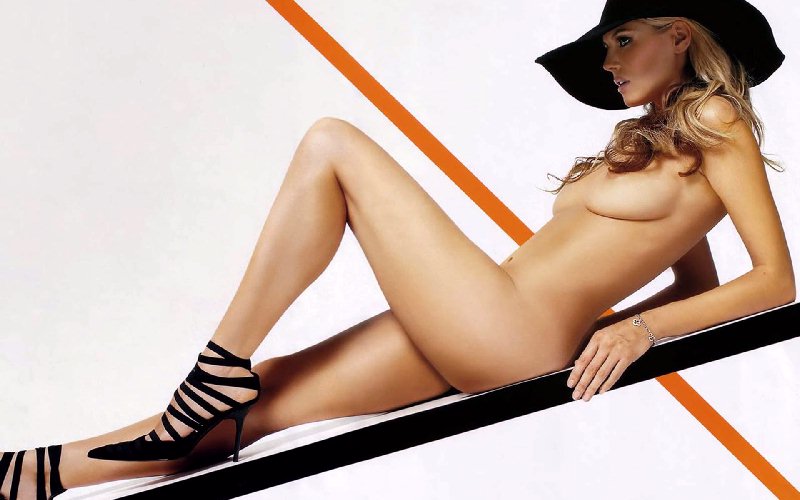
The World's Top Supermodels
| |
